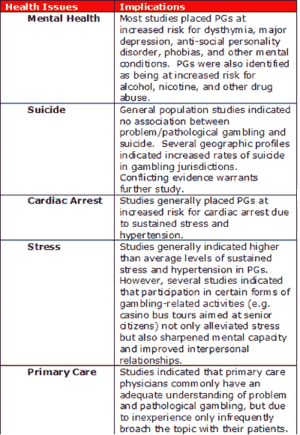The Wager, Volume 8(4) – The Hearty Gambler: How Gambling Affects Health
Like other addictive behaviors, gambling is often considered a precipitating factor in a variety of health problems. In an effort to gain a greater understanding of the effects of problem and pathological gambling on human physiology, Potenza, Fiellin, Heninger, Rounsaville, and Mazure (2002) conducted a literature review of a sample of existing studies that examined various aspects of gambling’s impact on the gamblers’ physical and mental health. This week’s WAGER presents the findings of this report.
Using the MEDLINE search engine, Potenza et al. identified 227 peer-reviewed articles that discussed screening and treatment strategies for problem and pathological gambling. Of these articles, the authors identified and retained for analysis 127 publications that also included a discussion of health status among gambling populations. The remaining 100 articles did not report health status and were excluded from the review.
The authors presented and compared the study findings that related to several specific health issues and primary care in general. A summary of their review is presented in Table 1.
Table 1. Summary of Health and Primary Care Implications of Gambling* (Potenza et al., 2002)
The authors suggested an increased role for primary care physicians in presenting the dangers of excessive gambling and screening their patients for gambling problems. They also indicated that such action on the part of physicians could aid in the development of more effective treatment strategies for comorbid health problems commonly experienced by PGs. While the authors’ review identified links between gambling activity and health conditions, it is clear that there is a continuing need for research specifically designed to establish causal relationships between gambling and individual health problems. Also, while the authors make suggestions as to the proper role of the primary care physician in the diagnosis and treatment of problem and pathological gambling, only further investigation will more clearly define this role. For example, while the authors mainly focus on the role of the primary care physician in regard to screening and referral to treatment, it is possible that with specialized training, primary care physicians could further utilize the intimate office setting as an initiation point for early intervention efforts.
Potenza et al. provide a useful guide to the health issues that problem and pathological gamblers face, and create a launching-point for future study into incorporating other illnesses into the diagnosis and treatment of gambling disorders as well as incorporating PG into the diagnosis and treatment of other disorders.
Comments on this article can be addressed to Tony Donato
* It should be noted that the authors do not make conclusive statements regarding the effect of gambling on any of these health areas, but instead recommend further study.
References
Potenza, M. N., Fiellin, D. A., Heninger, G. R., Rounsaville, B. J., & Mazure, C. M. (2002). Gambling: An addictive behavior with health and primary care implications. Journal of General Internal Medicine, 17, 721-732.
